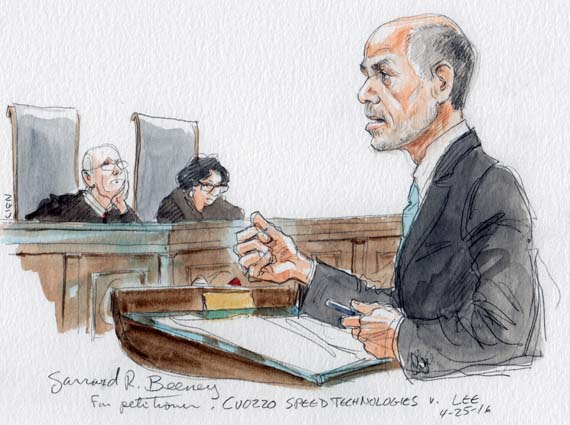 Image credit: SCOTUSblog
Image credit: SCOTUSblog
Summary: Much-anticipated decision on the Cuozzo v Lee case (at the highest possible level) serves to defend the appeal boards which are eliminating software patents by the thousands
THE previous post spoke about Alice v CLS and its impact on software patenting in the US. Lots of encouraging news regarding software patents could be found as of late, not just in the US but also in India. Battistelli's EPO and the UPC are the only setbacks right now.
Yesterday night we found lots of articles about the
Cuozzo v Lee decision [PDF] (at
SCOTUS level). As of midnight, all the following covered the decision (the decision on the gun ban received a lot more coverage):
Here is the corresponding
SCOTUSblog page. As expected, IAM's propagandists still refer to PTAB -- which effectively invalidates a lot of software patents -- as a "death squad", even right there in the headline. Well, IAM is a death squad of science and technology (they promote patent trolls and software patents). To
quote their biased piece: "In what will widely be considered as a blow to patent owners [sic], the Supreme Court of the US (SCOTUS) this morning declined to overhaul two key tenets of the post-issuance review proceedings, leaving the broadest reasonable claim interpretation intact and ruling that review decisions were not appealable. The Court’s decision in Cuozzo v Lee had been much anticipated by US patent owners [sic], many of whom have seen their patents challenged and claims invalidated in inter partes reviews (IPR) over the last four years."
All those inter partes reviews which we mentioned here before were great news to software developers, who simply (based on many polls) do not want software patents. Here is what
Patently-O wrote about it:
The Supreme Court has upheld the AIA provision barring challenges to the Patent Office’s decision to institute inter partes review. 35 U. S. C. €§314(d). In addition, Justice Breyer’s majority opinion approved of the Patent Office’s approach of applying the broadest reasonable construction (BRI) standard to interpret patent claims – finding it a “reasonable exercise of the rulemaking authority that Congress delegated to the Patent Office.”
The Court was unanimous as to the BRI standard however, Justices Alito and Sotomayor dissented from the no-appeal ruling – they would have interpreted the statute as limiting interlocutory appeals but still allowing review of the decision to institute within the context of an appellate review of the PTO’s final decision on the merits.
There's hope that the
USPTO will improve quality control and maybe even become better than the
EPO, where
quality has declined rapidly under Battistelli. As a side note, WatchTroll
talks about the openwashing efforts of the USPTO (mentioned here earlier this month), namely the open APIs.
We would like to commend the US Supreme Court and even the USPTO for doing the right thing by tightening patent scope. This can, in due course, sandbox a lot of patent trolls.
⬆

 Image credit: SCOTUSblog
Image credit: SCOTUSblog